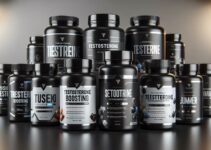You've probably heard about testosterone supplements and their potential impact on fat reduction, but have you ever wondered about the science behind it? The relationship between testosterone levels and fat metabolism is a complex and intriguing subject that has garnered significant attention in the world of health and fitness. As you explore the mechanisms of how testosterone influences fat stores and body composition, you'll uncover the potential role of testosterone boosters in enhancing fat loss. Understanding the intricate interplay between hormones and fat reduction may just change the way you think about weight management strategies.
Key Takeaways
- Testosterone supplementation can reduce fat stores, particularly in abdominal and visceral areas.
- Higher testosterone levels support protein synthesis for muscle growth and repair, leading to an increase in lean muscle mass.
- Testosterone influences hormonal balance, enhancing fat metabolism and promoting a leaner body composition.
- Testosterone boosters can play a significant role in promoting fat reduction and overall weight management.
Testosterone and Fat Metabolism
Testosterone plays a crucial role in regulating fat metabolism by influencing the expression of key enzymes involved in lipolysis and adipogenesis. When testosterone levels are low, there is a shift towards central fat distribution, increasing the risk of metabolic disorders. Studies have shown that low testosterone levels are associated with increased abdominal obesity and insulin resistance. This suggests that testosterone has a significant impact on fat distribution in the body.
Research has also demonstrated that testosterone influences the activity of lipoprotein lipase, an enzyme that plays a key role in the uptake of fatty acids into adipose tissue. Higher testosterone levels have been associated with reduced lipoprotein lipase activity, which may contribute to a more favorable fat distribution pattern. Additionally, testosterone has been found to inhibit the differentiation of preadipocytes into mature fat cells, thereby affecting adipogenesis.
Understanding the relationship between testosterone levels and fat distribution is crucial in the development of strategies to combat obesity and metabolic syndrome. By elucidating the mechanisms through which testosterone influences fat metabolism, potential interventions targeting testosterone pathways may offer promising approaches for managing obesity and its associated complications.
Impact on Body Composition
In studies investigating the impact of testosterone supplements on body composition, researchers observed significant changes in lean muscle mass and fat mass among participants. Testosterone levels play a crucial role in regulating body composition, particularly in influencing the distribution of muscle and fat. Here's what the data reveals about the impact of testosterone supplements on body composition:
- Increase in Lean Muscle Mass: Testosterone supplements have been linked to an increase in lean muscle mass. Higher testosterone levels support protein synthesis, which is essential for muscle growth and repair.
- Reduction in Fat Mass: Research indicates that testosterone supplements can lead to a reduction in fat mass. This is attributed to the ability of testosterone to influence hormonal balance, leading to enhanced fat metabolism and a shift towards a leaner body composition.
- Improvement in Body Composition: Overall, the data suggests that optimizing testosterone levels through supplementation can positively impact body composition by promoting lean muscle development and reducing fat mass, thereby contributing to a healthier and more balanced physique.
Hormonal Influence on Fat Stores
Exploring the hormonal influence on fat stores unveils the intricate interplay between testosterone levels and adipose tissue distribution, shedding light on the physiological mechanisms behind fat reduction observed in the context of testosterone supplementation. Hormonal balance plays a crucial role in determining fat distribution within the body. Testosterone, predominantly a male sex hormone but also present in smaller amounts in females, influences fat distribution by promoting the storage of fat in visceral adipose tissue rather than subcutaneous fat. This distribution pattern has significant implications for overall health, as visceral fat accumulation is associated with an increased risk of metabolic disorders such as type 2 diabetes and cardiovascular disease. The table below summarizes the impact of hormonal balance on fat distribution.
| Hormone | Influence on Fat Distribution |
|---|---|
| Testosterone | Promotes visceral fat storage |
| Estrogen | Promotes subcutaneous fat storage |
| Cortisol | Promotes visceral fat storage |
Understanding the hormonal influence on fat stores is integral to comprehending the effects of testosterone supplementation on fat reduction and highlights the necessity of maintaining a healthy hormonal balance for optimal fat distribution and overall health.
Mechanisms of Fat Reduction
Understanding the mechanisms responsible for fat reduction is essential for comprehending the impact of testosterone supplementation on body composition and overall health. When it comes to fat reduction, testosterone supplements operate through specific physiological mechanisms, primarily targeting hormone regulation and lipid breakdown. Here's how it works:
- Hormone Regulation: Testosterone plays a crucial role in regulating various hormones involved in fat metabolism. It enhances the production of growth hormone, which in turn stimulates the breakdown of stored fat. Additionally, testosterone influences the balance of other hormones such as insulin and cortisol, which can impact fat storage and utilization.
- Lipid Breakdown: Testosterone supplementation promotes lipid breakdown by increasing the activity of lipolytic enzymes. These enzymes are responsible for breaking down triglycerides into free fatty acids and glycerol, which can then be utilized as a source of energy by the body. This process helps in reducing fat stores, especially in abdominal and visceral areas.
Understanding these mechanisms sheds light on how testosterone supplements can effectively contribute to fat reduction and improve body composition. It also underscores the intricate relationship between hormones, metabolism, and body fat regulation.
Testosterone's Role in Weight Management
Boosting testosterone levels through supplementation actively contributes to managing weight by influencing metabolic processes and body composition. Testosterone plays a crucial role in regulating fat distribution, muscle mass, and overall metabolic rate. Research suggests that low testosterone levels in men are associated with an increased prevalence of obesity and metabolic syndrome. Additionally, low testosterone levels have been linked to reduced energy expenditure and insulin sensitivity, both of which are important factors in weight management.
| Testosterone Levels | Impact on Weight Management |
|---|---|
| Low | Increased risk of obesity and metabolic syndrome, reduced energy expenditure, and insulin sensitivity. |
| Normal | Maintenance of healthy body composition, regulated metabolic rate, and improved energy expenditure. |
| High | Enhanced muscle mass, reduced fat deposition, and increased metabolic rate. |
Understanding the impact of testosterone levels on weight management is crucial when considering weight loss strategies. In cases of low testosterone levels, supplementation may be beneficial, especially when combined with a balanced diet and regular exercise. However, it is important to consult with a healthcare professional before initiating any supplementation regimen, as individual responses to testosterone supplementation may vary.
Enhancing Fat Loss With Testosterone Boosters
Testosterone plays a crucial role in regulating metabolism, which can impact fat loss. Increasing testosterone levels can also lead to an increase in muscle mass, which in turn can help with fat reduction. By understanding the relationship between testosterone, metabolism, and muscle mass, you can effectively enhance fat loss with testosterone boosters.
Testosterone and Metabolism
Metabolism plays a crucial role in the body's ability to regulate energy expenditure and fat utilization, making it a key factor in the potential impact of testosterone on fat reduction. Testosterone levels are intricately linked to metabolic rate, influencing the body's ability to burn calories efficiently. Here are three ways in which testosterone impacts metabolism:
- Muscle Mass: Testosterone promotes the growth of lean muscle mass, which can increase metabolic rate as muscles require more energy at rest compared to fat tissue.
- Fat Distribution: Higher testosterone levels can affect fat distribution, leading to reduced accumulation of visceral fat, which is associated with metabolic disturbances.
- Insulin Sensitivity: Testosterone has been shown to improve insulin sensitivity, potentially aiding in the regulation of blood sugar levels and metabolism.
Understanding the intricate relationship between testosterone and metabolism is essential in evaluating the potential impact of testosterone boosters on fat reduction.
Muscle Mass and Fat
Enhancing fat loss through the promotion of lean muscle mass is a key aspect to consider when evaluating the potential impact of testosterone boosters. Testosterone plays a crucial role in muscle building, which in turn contributes to weight loss. Studies have shown that higher levels of testosterone can lead to an increase in muscle mass and a decrease in body fat. Testosterone boosters work by enhancing protein synthesis, which aids in the development of lean muscle tissue and subsequently elevates the body's metabolic rate. This increase in metabolism facilitates the burning of fat stores, thereby promoting weight loss. Additionally, testosterone has been linked to the regulation of insulin, which can impact fat storage and utilization. Therefore, by promoting muscle building and influencing metabolic processes, testosterone boosters can play a significant role in enhancing fat loss and promoting overall weight management.
Frequently Asked Questions
Are There Any Potential Side Effects or Risks Associated With Using Testosterone Supplements for Fat Reduction?
Using testosterone supplements for fat reduction may disrupt your hormonal balance, leading to potential risks such as increased aggression, acne, and liver problems. It's essential to consider these side effects before starting any supplement regimen.
Can Women Also Benefit From Using Testosterone Supplements for Fat Reduction, or Are They Only Effective for Men?
Hey there! Testosterone supplements can be effective for women in reducing fat. However, potential side effects and risks exist. Results timeline, diet, exercise, medical conditions, and medication interactions must be considered for optimal effectiveness and safety.
How Long Does It Typically Take to See Results From Using Testosterone Supplements for Fat Reduction?
Typically, it takes several weeks to notice results from using testosterone supplements for fat reduction. The timeframe varies based on individual testosterone levels, exercise regimen, and diet plan. Consistency is key to seeing significant changes.
Are There Any Specific Diet or Exercise Recommendations to Maximize the Fat Reduction Effects of Testosterone Supplements?
To maximize the fat reduction effects of testosterone supplements, it's crucial to focus on a balanced diet and regular exercise routine. Both diet and exercise play a key role in optimizing muscle growth and hormone levels.
Are There Any Specific Medical Conditions or Medications That Could Interact With Testosterone Supplements and Affect Their Fat Reduction Benefits?
You should be aware of potential drug interactions and medical conditions that could affect the fat reduction benefits of testosterone supplements. Certain hormonal medications or health conditions may impact the effectiveness of testosterone supplements for fat reduction.

